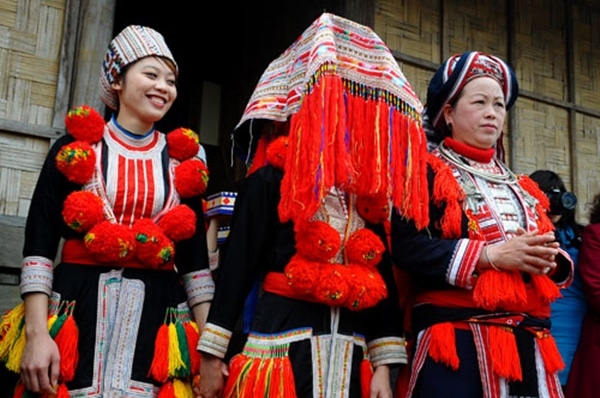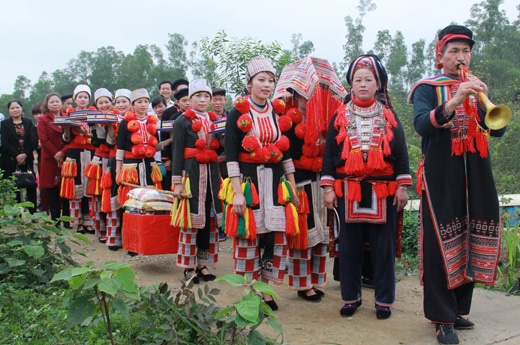Dzao people with their own unique features contribute to the richness of cultural identity of minority groups in Ha Giang. Those varieties include the traditional wedding which is carried out through different ceremonies.
Before the wedding, the house is decorated beautifully. Elderly people are the very important ones who have a deep understanding of customs and rituals. At the traditional wedding, the groom wears a black turban folded several layers while the bride wears the traditional long dress, a silver string around her waist with lots of bracelets and a silver ring.

Wedding of Dzao pepple (Source: Internet)
The wedding starts from the previous day’s afternoon until the next morning. To take the bride home, relatives of the groom are challenged by responding to traditional songs and drinking wine. Dzao people perceive that if the couple overcomes these challenges, they will gain lots of luck and live happily together. By the next morning, the bride is taken out of the room by her mother. Before her ancestors’ altar, the bride and groom together pray for their happiness. After that, the groom takes the bride home. According to the customs of the Dzao people, the crowd must follow some strict rules that guarantee forever happiness for the bride and the groom on the way going back to the groom’s house. These rules include going straight, not passing under the trough or go behind the house of others. Upon arrival at the groom’s home, people have to wait for the storyteller to conduct some rituals before getting into the house. The couple came to the ancestral altar to pray for themselves, drink wine and to listen to advice.

Wedding of Dzao people (Source: Internet)
Three days after the wedding, the bride is not allowed to visit her parents and her villages as well. Then, within a certain period of time which has been agreed by the two sides, the couple can return to the bride’s home to greet her parents, siblings, and relatives staying there. On the date of appointment, the two families together with the new couple gather to do another ritual.
Unlike in the past, young men and women of Dzao people can freely find and marry equally with other ethnic groups thanks to the cultural intersection. Many customs at the wedding ceremony of the Dzao people have been exempted to suit with the conditions of each family, but still, retain the rich traditional features.
Nguyen T. Thao
